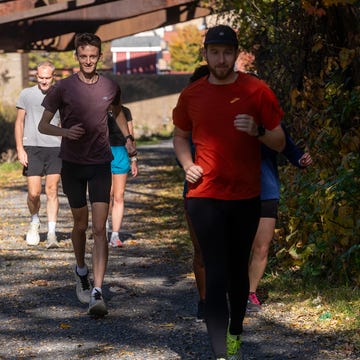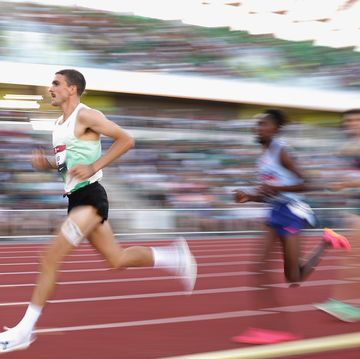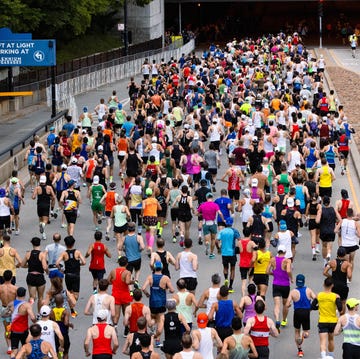What you do in the hours before the start of a race can have a big impact on your racing performance. Let’s look at what’s important and what’s not on race day.
Many runners worry needlessly about how much sleep they get the night before a big race. Typically, the more critical they think it is, the less sleep they get. You can relax. How much sleep you get the night before a race has not been shown to affect race performance. What is important is how well you sleep over many nights leading up to your race—chronic sleep deprivation affects both your body’s ability to recover and your ability to concentrate during the race.
You should load up on carbohydrates for one (before most races) to three (before a marathon) days leading up to your race, so the role of your pre-race breakfast is to top up your liver glycogen stores and maintain your blood glucose level. Your pre-race breakfast should typically contain 100 to 200 grams of carbohydrates and be low in fat and fiber with a moderate level of protein. Several studies have found improved endurance performance after pre-race meals with a low glycemic index; however, this seems somewhat variable between athletes and personal food preferences and tolerance seem to be the most important factors. If the race is early in the morning or you are too nervous to eat, then a high carbohydrate sports drink or liquid meal replacement is a good option.
How long before the race you should eat depends on how much and what foods you will eat, and your individual tolerance. For most runners, a light breakfast two-and-a-half to three hours before the race is fine. To find what works best for you, test your pre-race meal before less important races and workouts.
Drink enough (but not excessively) the day before the race so that you are already well-hydrated and only need to maintain your hydration level on the morning of the race. To top off your tank, drink about a pint of fluid the morning of the race. Sports drinks containing carbohydrates and sodium provide useful energy and help ensure fluid retention.
Warming up
The purpose of warming up is to prepare your body to run at race pace. The shorter the race, the more important this is since the physiological demands are higher and there isn’t time to gradually build up to race pace. There are also psychological benefits from a warm-up routine, which help you remain relaxed and confident.
When you accelerate at the start of a race, the amount of blood pumped by your heart increases five to six times, and your oxygen consumption increases about 15 times. Warming up prepares your energy systems by increasing your heart rate, breathing rate, blood flow to your working muscles, and oxygen consumption, and activates enzymes for aerobic energy production. If you do not warm up thoroughly, you put unnecessary strain on your cardiovascular system and produce more lactate.
A thorough warm-up also increases your muscle temperature, which makes your muscles and tendons less stiff, so they are ready to work hard with less risk of injury. Since the heat your muscles produce contributes to your body’s heat load, you should reduce the length of your warm-up on a hot day. In hot weather, you can also wear a cooling vest to keep your trunk relatively cool while your cardiovascular system and running muscles warm up.
An optimal warm-up includes three simple steps:
1. Run for 10 to 15 minutes, beginning slowly and gradually increasing your pace so the last one to two minutes are at close to race pace. The shorter the race, the longer this warm-up run should be. 2. Stretch gently for 10 to 15 minutes. Stretching helps prepare your muscles for the longer stride length used when racing. Studies have found, however, that too much static stretching temporarily reduces muscle strength, so limit your stretching to two to three repetitions per muscle group and do not hold your stretches for more than 10 to 15 seconds. 3. Run for approximately five more minutes, followed by several striders of roughly 100 meters up to race pace. For most runners, about six striders before a 5K, four before a 10K, and two before a half-marathon is optimal.
Time your warm-up so that you are ready about five minutes before the race starts. Keep moving during those last few minutes, and in cold weather try to keep a hat and warm top on as close to the start as possible. Give yourself enough time to warm up completely, but avoid the common error of warming up too early. Your entire warm-up should take 30 to 40 minutes, which can extend to an hour with a couple of toilet stops. The problem with starting your warm-up too early is that you either need to continue warming up longer (using extra energy) or you complete the warm-up too long before the start of the race and lose some of the benefits.
Before a marathon, the benefits of warming up are counterbalanced by the need to conserve your carbohydrate stores. Your warm-up only needs to prepare you to run at marathon pace, which you can accomplish by running easily for about five minutes, gradually increasing your speed up to race pace. Skip the striders before a marathon because they burn up carbohydrates needlessly.












